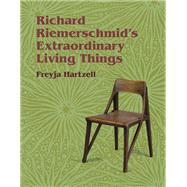Richard Riemerschmid's Extraordinary Living Things
, by Hartzell, Freyja- ISBN: 9780262047425 | 026204742X
- Cover: Hardcover
- Copyright: 11/1/2022
How Richard Riemerschmid’s designs of everyday—but “extraordinary”—objects recalibrate our understanding of modernism.
At the beginning of the twentieth century, German artist Richard Riemerschmid (1868–1957) was known as a symbolist painter and, by the advent of World War I, had become an important modern architect. This, however, the first English-language book on Riemerschmid, celebrates his understudied legacy as a designer of everyday objects—furniture, tableware, clothing—that were imbued with an extraordinary sense of vitality and even personality. Freyja Hartzell makes a case for the importance of Riemerschmid's designed objects in the development of modern design—and for the power of everyday things to change the way we live our lives, understand history, and design our future. Hartzell offers for the first time an interpretive history of Riemerschmid's design practice embedded in a fresh examination of modernism told by the objects themselves.
Hartzell explores Riemerschmid's early drawings, paintings, and prints; his interiors and housewares, which represent a modernist shift from exclusive image to accessible object; his designs for women's clothing; his immensely popular wooden furniture; his serially produced ceramics and their appeal to German nationalism of the period; and his complex and compelling pattern designs for textiles and wallpapers, the only part of his creative practice that spanned his entire career. Riemerschmid, Hartzell writes, was at his most inventive, playful, and free when designing things for everyday use. His uniquely designed forms allow us to recognize the utilitarian object not just as a tool but as an individual being—a thing with a soul.
At the beginning of the twentieth century, German artist Richard Riemerschmid (1868–1957) was known as a symbolist painter and, by the advent of World War I, had become an important modern architect. This, however, the first English-language book on Riemerschmid, celebrates his understudied legacy as a designer of everyday objects—furniture, tableware, clothing—that were imbued with an extraordinary sense of vitality and even personality. Freyja Hartzell makes a case for the importance of Riemerschmid's designed objects in the development of modern design—and for the power of everyday things to change the way we live our lives, understand history, and design our future. Hartzell offers for the first time an interpretive history of Riemerschmid's design practice embedded in a fresh examination of modernism told by the objects themselves.
Hartzell explores Riemerschmid's early drawings, paintings, and prints; his interiors and housewares, which represent a modernist shift from exclusive image to accessible object; his designs for women's clothing; his immensely popular wooden furniture; his serially produced ceramics and their appeal to German nationalism of the period; and his complex and compelling pattern designs for textiles and wallpapers, the only part of his creative practice that spanned his entire career. Riemerschmid, Hartzell writes, was at his most inventive, playful, and free when designing things for everyday use. His uniquely designed forms allow us to recognize the utilitarian object not just as a tool but as an individual being—a thing with a soul.







